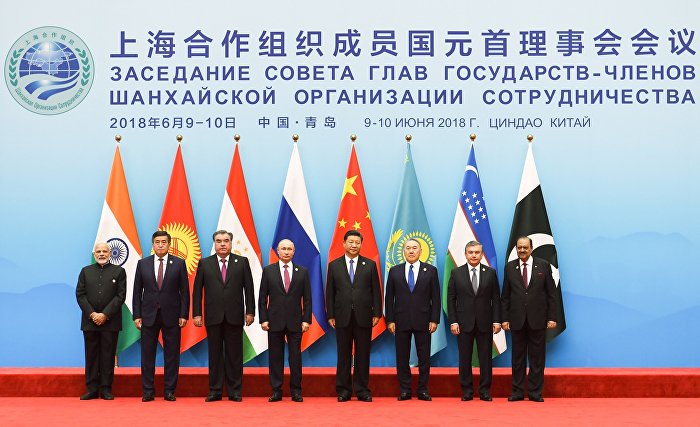
Shanghai Cooperation Organisation looking frosty from Astana
At the June summit of the Shanghai Cooperation Organisation (SCO), Kazakh President Nursultan Nazarbayev said the strategic priority is to “strengthen political dialogue and trust, ensuring security and development in the space of our organisation”. He urged member- states to boost the trade and investment projects from a bilateral to a multilateral level. But Nazarbayev’s speech belies Kazakhstan’s mixed relationship with the SCO says the author
‘Kazakhstan is one of Russia’s closest allies in Central Asia, and the relationship between Russia and Kazakhstan plays an important role in the functioning of the SCO. But the relationship has recently become rocky: Kazakhstan was criticised by the Russian media over Astana’s decision to allow US ships to use Kazakhstan’s Caspian Sea ports to supply US forces in Afghanistan. On 11 June, Russian Foreign Minister Sergey Lavrov issued concerns to Kazakhstan regarding its increased cooperation with the United States in a meeting of the Russia-led Collective Security Treaty Organization. Kazakhstan’s recent move from Cyrillic to Latin script is also being perceived as an attempt to move away from Moscow’s influence. Meanwhile, the latest round of Western sanctions on Russia have caused Astana’s policymakers to worry about the economic future of the Eurasian Economic Union.
Kazakhstan–China relations are ostensibly faring better. According to the official Kazakh narrative, relations between Kazakhstan and China are exemplary and Astana is eager to capture the opportunities provided by China’s Belt and Road Initiative.
China has pledged to provide more than US$600 million to support the development of transport infrastructure in Kazakhstan within the next five years, and Chinese companies are building a light rail transit system in Astana with US$1.9 billion that Kazakhstan borrowed from the China Development Bank.
More than 127 projects cumulatively worth US$67 billion were signed between Kazakhstan and China in the past six years. New joint projects were also discussed during Nazarbayev’s last visit to China in areas such as energy, oil and gas, new technologies and cultural cooperation.
But there are emerging tensions in the Kazakhstan–China relationship too. Oppression of predominantly Muslim Uyghurs and Kazakhs in western China is catching the attention of Astana’s media and officials.
The Kazakh Ministry of Foreign Affairs held tense negotiations with Chinese diplomats regarding the ill treatment and detention of ethnic Kazakhs in the Chinese restive region of Xinjiang at the end of May.
Another worry is the increased vulnerability of Central Asian countries to Belt and Road investments. Kazakhstan owes almost US$12.3 billion to Beijing, which makes China Kazakhstan’s fourth biggest creditor.
Closer Kazakh cooperation with China could paradoxically lead to increased anti-China resentment among Kazakh people: recent attempts by the Kazakh government to rent land to foreigners, including Chinese investors, resulted in huge protests across the country. Cumulatively, these issues could fuel existing Sino-phobia in Kazakhstan and Central Asia more broadly.
Further, Nazarbayev turns 78 on 6 July and lacks an imminent successor. Chairman of the Kazakh Senate Kassym-Jomart Tokayev has recently hinted that Nazarbayev might not run in the 2020 election, which has caused rumours about the apparent political transition.
The resultant political uncertainty for Astana may begin to surface in how Kazakhstan plays its role in the SCO and in its relationships with both Russia and China. (Courtesy: East Asia Forum)
– by Bakhytzhan Kurmanov, Nazarbayev University
(The author is an alumnus of the Australian National University, Canberra)
-
CHINA DIGEST
-
 ChinaChina Digest
China’s PMI falls for 3rd month highlighting challenges world’s second biggest economy faces
ChinaChina Digest
China’s PMI falls for 3rd month highlighting challenges world’s second biggest economy faces
-
 ChinaChina Digest
Xi urges Chinese envoys to create ‘diplomatic iron army’
ChinaChina Digest
Xi urges Chinese envoys to create ‘diplomatic iron army’
-
 ChinaChina Digest
What China’s new defense minister tells us about Xi’s military purge
ChinaChina Digest
What China’s new defense minister tells us about Xi’s military purge
-
 ChinaChina Digest
China removes nine PLA generals from top legislature in sign of wider purge
ChinaChina Digest
China removes nine PLA generals from top legislature in sign of wider purge
-
-
SOUTH ASIAN DIGEST
-
 South Asian Digest
Kataragama Kapuwa’s arrest sparks debate of divine offerings in Sri Lanka
South Asian Digest
Kataragama Kapuwa’s arrest sparks debate of divine offerings in Sri Lanka
-
 South Asian Digest
Nepal: Prime Minister Dahal reassures chief ministers on police adjustment, civil service law
South Asian Digest
Nepal: Prime Minister Dahal reassures chief ministers on police adjustment, civil service law
-
 South Asian Digest
Akhund’s visit to Islamabad may ease tensions on TTP issue
South Asian Digest
Akhund’s visit to Islamabad may ease tensions on TTP issue
-
 South Asian Digest
Pakistan: PTI top tier jolted by rejections ahead of polls
South Asian Digest
Pakistan: PTI top tier jolted by rejections ahead of polls
-






Comments